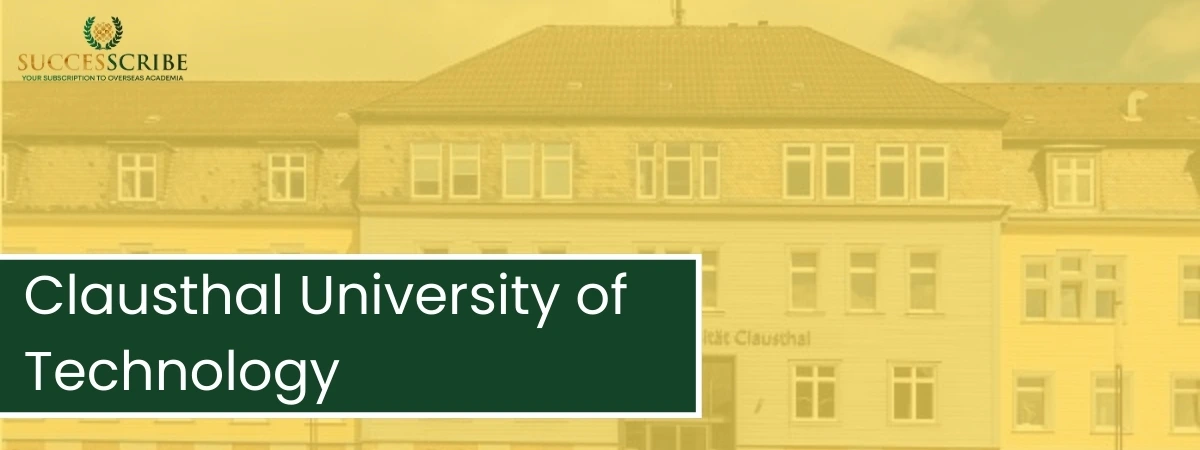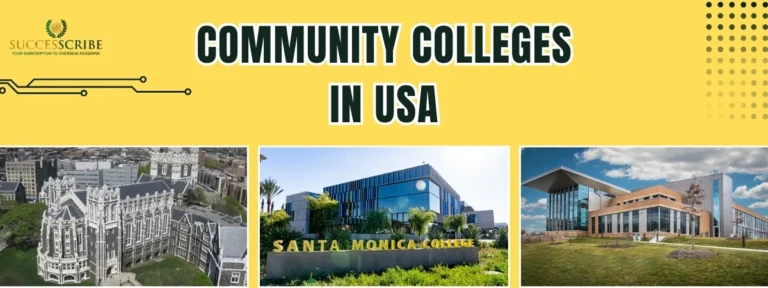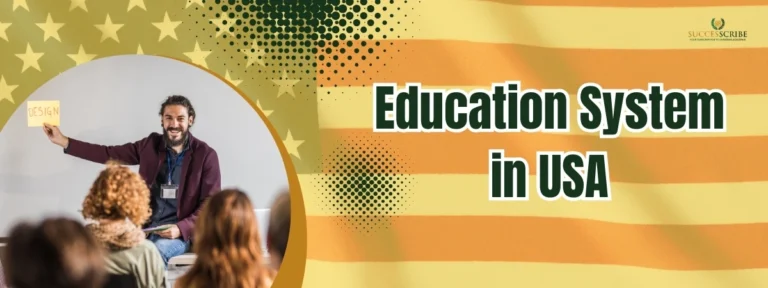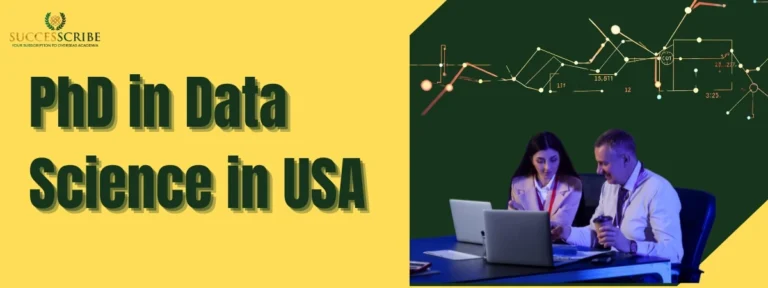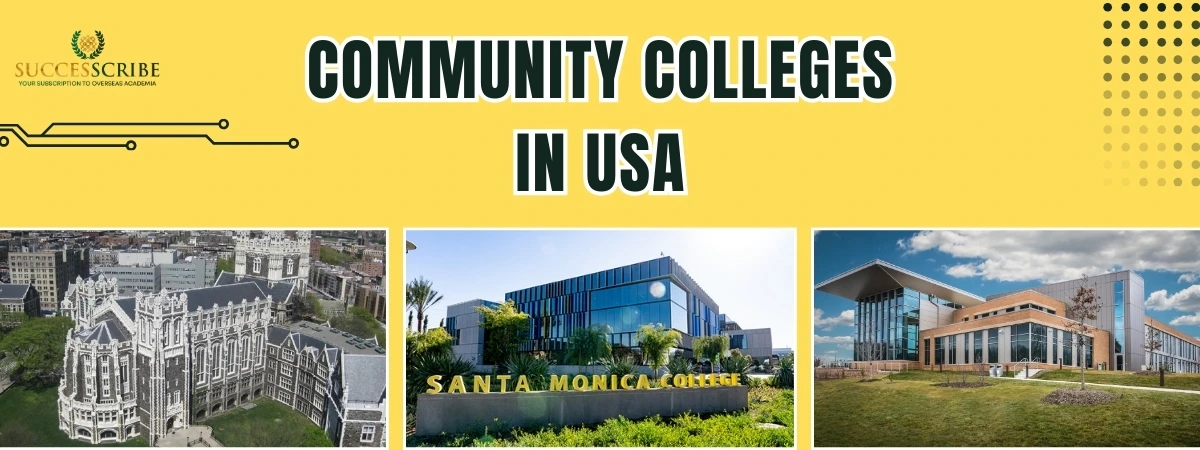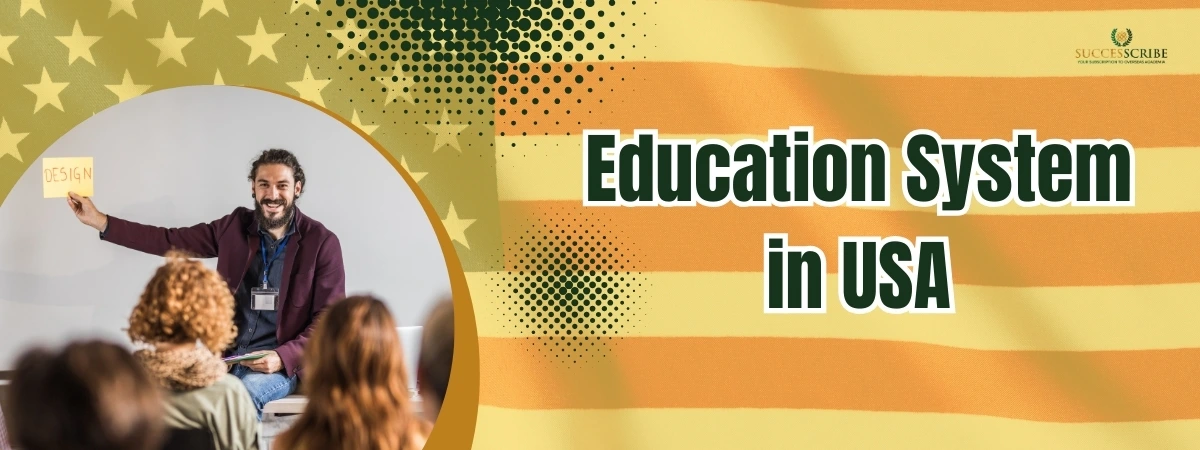Clausthal University of Technology (Technische Universität Clausthal, TU Clausthal), established in 1775, is a renowned public research university in Clausthal-Zellerfeld, Lower Saxony, Germany. With a focused portfolio in mining, metallurgy, engineering, energy, sustainability, and circular economy, it is among Germany’s most internationally oriented universities, where around 50% of students come from abroad. Known for strong industry connections, small class sizes, and niche technical specializations, TU Clausthal offers an immersive and supportive environment for international students.
Key Highlight
| Feature | Details |
| Type | Public Technical University |
| Location | Clausthal-Zellerfeld, Lower Saxony, Germany |
| Founded | 1775 |
| Student body | 3,000 |
| International | 50% of students |
| Notable Research Areas | Mining, Raw Materials, Circular Economy, Sustainability, Engineering |
| Language of Instruction | Mainly German; select Master’s programs may be offered in English (verify per program) |
Reasons to Choose TU Clausthal?
Here are the top reasons why choose Clausthal University of Technology:
- Highly international community: Approx. 50% international students, fostering diverse peer interaction.
- Niche strengths: Exceptional offerings in mining, raw materials, metallurgy, petroleum engineering, sustainability, and circular economy.
- Compact, supportive campus: Small size ensures personalized attention, strong student-staff interaction.
- Historic legacy & reputation: Among Germany’s oldest technical universities, frequently ranked strongly in engineering by CHE.
- Alumni success: Well-placed graduates in top German corporations in energy, materials, and industry.
Top Programs at Clausthal University of Technology
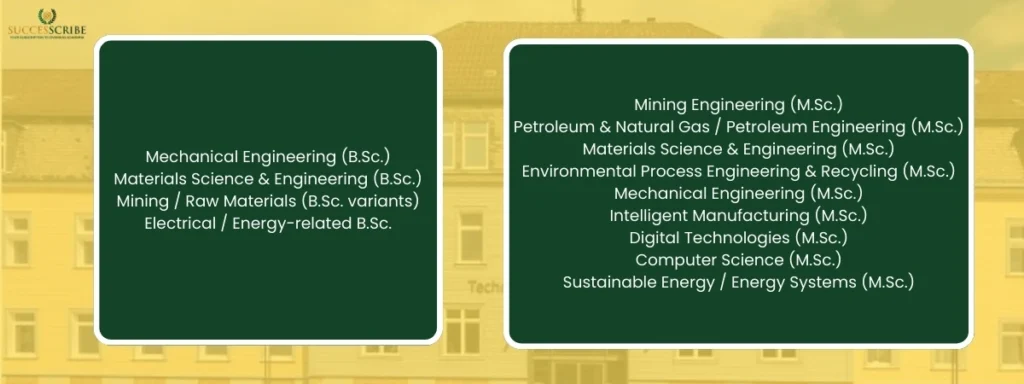
TU Clausthal’s strongest and most distinctive areas are raw materials / mining, materials & process engineering, petroleum & energy engineering, environmental process engineering / recycling (circular economy), and selected digital / manufacturing programmes. The circular economy is a central profile topic across courses.
Bachelor’s Programs
Most Bachelor’s programmes at TU Clausthal are taught in German. Direct admission is possible if your school leaving certificate is equivalent and you have the required German language level. Always check the specific programme page for exact ECTS and language requirements.
| Program (selected) | Typical language | Typical duration | Why students pick it |
| Mechanical Engineering (B.Sc.) | German | 6 semesters (180 ECTS typical in Germany, check program) | Broad engineering foundations, pathways to Mech. M.Sc. |
| Materials Science & Engineering (B.Sc.) | German | 6 semesters | Strong lab work; fits circular-economy focus. |
| Mining / Raw Materials (B.Sc. variants) | German | 6 semesters | Direct route into mining & resources sectors. |
| Electrical / Energy-related B.Sc. | German | 6 semesters | Relevant for energy systems and renewables. |
Master’s Programs
This is where TU Clausthal truly shines on the global stage. The university offers a vast array of consecutive Master’s programs taught entirely in English, attracting a diverse cohort of students from over 100 countries. These programs are designed to build directly upon a relevant Bachelor’s degree and dive deep into specialized, high-demand fields. Many Master’s programmes are 4 semesters (120 ECTS), verify the exact ECTS on each program page. Some Master’s programmes are offered with at least partial English instruction or explicit English variants (TU Clausthal indicates a number of Master’s courses can be taken in English, and some programmes explicitly state English as the medium).
| Programme (M.Sc.) | Language (as stated) | Typical duration |
| Mining Engineering (M.Sc.) | English | 4 semesters |
| Petroleum & Natural Gas / Petroleum Engineering (M.Sc.) | German | 4 semesters |
| Materials Science & Engineering (M.Sc.) | German (some modules may be in English) | 4 semesters |
| Environmental Process Engineering & Recycling (M.Sc.) | German (programme in English summary) | 4 semesters |
| Mechanical Engineering (M.Sc.) | German | 4 semesters |
| Intelligent Manufacturing (M.Sc.) | Mainly German; structured English options | 4 semesters |
| Digital Technologies (M.Sc.) | Mainly German; can be studied in English with a limited subject range | 4 semesters |
| Computer Science (M.Sc.) | German / check for English modules | 4 semesters |
| Sustainable Energy / Energy Systems (M.Sc.) | Varies | 4 semesters |
Quick Facts about TU Clausthal Programs
- Around 30% of all Master’s programs are offered in English, making it highly international-friendly.
- TU Clausthal is #1 in Germany for Mining & Petroleum-related engineering specializations
- Strong focus on sustainability, digitalization, and green energy – aligned with Germany’s climate-neutral 2045 goals.
- Average student–faculty ratio: 10:1, ensuring personalized attention.
Research & Innovation at TU Clausthal
TU Clausthal is a research-driven university, contributing significantly to engineering and sustainability innovation.
- Energy Research Center of Lower Saxony (EFZN) – Focus on renewable energy, smart grids, and hydrogen technology.
- Clausthaler Umwelttechnik-Institut (CUTEC) – Research in environmental technology, circular economy, and recycling.
- Industry-funded Research – Partnerships with BASF, Aurubis, Volkswagen, RWE, Siemens.
- Student Opportunities – Master’s students often participate in funded research projects, boosting employability.
Clausthal University of Technology Rankings
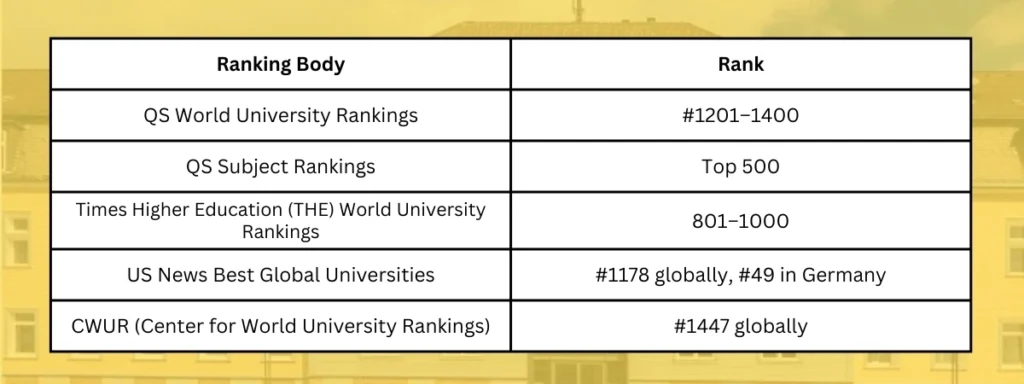
Clausthal University of Technology (TUC) is globally recognized as one of Germany’s specialized technical universities, particularly strong in engineering, natural sciences, and resource management. Though smaller in size compared to larger German institutions, its focused expertise ensures it consistently secures places in global rankings.
| Ranking Body | Rank | Category/Notes |
| QS World University Rankings | #1201–1400 | Recognized for strong research output and industry partnerships. |
| QS Subject Rankings | Top 500 | Engineering – Mineral & Mining. |
| Times Higher Education (THE) World University Rankings | 801–1000 | Noted for research influence and international outlook. |
| US News Best Global Universities | #1178 globally, #49 in Germany | Strong performance in engineering and natural sciences. |
| CWUR (Center for World University Rankings) | #1447 globally | Focus on research quality and alumni employment. |
Fees, Semester Contribution & Cost of Living
Navigating the real costs of studying at TU Clausthal is essential, so here’s a crystal-clear breakdown packed with verified figures.
1. Semester Contribution (Gebühr)
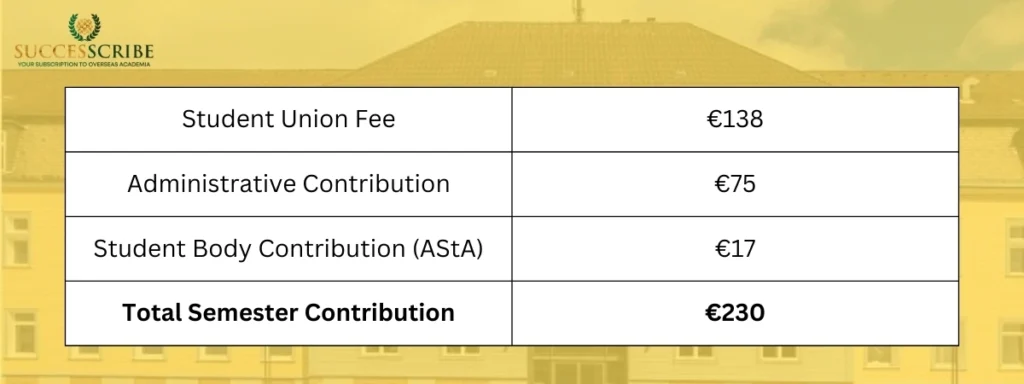
TU Clausthal charges a mandatory semester contribution, which includes student union and administrative fees:
| Component | Amount (per semester) |
| Student Union Fee | €138 |
| Administrative Contribution | €75 |
| Student Body Contribution (AStA) | €17 |
| Total Semester Contribution | €230 |
| (Extended study fee applies beyond standard duration) | €500 one-time extra for long-term students |
Tuition Fees
As a public university, TU Clausthal does not charge tuition fees for Bachelor’s or Master’s programmes, including for international students. The semester contribution above is the only recurring academic fee.
Monthly Cost of Living in Clausthal-Zellerfeld
Clausthal-Zellerfeld is one of the more affordable university towns in Germany. Here’s a breakdown of the typical monthly expenses:
| Item | Estimated Cost | Notes |
| Accommodation (student dorm) | €230–€420 | Student residences via Studentenwerk OstNiedersachsen |
| Accommodation (shared flat / WG) | €150–€300 | Reported common rent for WG rooms |
| Health Insurance | €120 | Based on IZC estimation ; typical statutory insurance for students 125€/month |
| Food, Books, Misc | €400–€500 | |
| Utilities & Internet | Electricity + Heating + Water: €586 (for 85㎡ apartment); Internet: €44–48/month | |
| Restaurants & Eating Out | Meal: €9.40; Cappuccino: €2.90; Fast Food: ~€7.60 |
Overall monthly estimate:
- On-campus housing route: €900/month
- Shared flat/WG route: €900–€1,100/month depending on lifestyle choices and utilities.
Scholarships & Funding at TU Clausthal
Looking to support your studies at Clausthal University of Technology? Explore the key funding options below, including university scholarships, national programmes, and practical ways to earn while studying.
| Scholarship / Funding | Who Can Apply | Support Provided |
| Deutschlandstipendium (Germany Scholarship) | German & International students (UG & PG) | €300 per month for 1 year |
| Company & Foundation Scholarships | Students in engineering & technical fields | Varies (€500 – €1,500 per month) |
| DAAD Scholarships | International students (Bachelor, Master, PhD) | Tuition fee waiver, living costs, travel allowance |
| HiWi Jobs (Student Assistant Jobs) | Enrolled students at TU Clausthal | Part-time income (8–15 hrs/week) |
| BAföG (German Student Aid) | German & select international students | Covers part of study & living costs |
| STIBET Scholarships (by DAAD, offered at TU Clausthal) | International students with good performance | €300 – €600 per month |
Admission Requirements at Clausthal University of Technology
Thinking of applying to TU Clausthal? Here’s everything you need to know about admission requirements for Bachelor’s (UG) and Master’s (PG) programs.
Undergraduate (Bachelor’s) Admission Requirements
- A recognized university entrance qualification (equivalent to German Abitur).
- Accepted alternatives:
- Fachabitur (subject-specific diploma)
- Vocational Meister/Techniker certificates
- Equivalent international qualifications
- No GPA cut-off – if your documents are correct and submitted on time, admission is usually granted.
- Application is direct via TU Clausthal’s portal (not Uni-Assist).
Deadline (Winter Semester 2025/26): 15 October 2025
Postgraduate (Master’s) Admission Requirements
- A Bachelor’s degree in a relevant field.
- Each Master’s program may have specific subject requirements. For example:
- Mechanical Engineering (MSc) – requires a B.Sc. in Mechanical Engineering or related.
- Digital Technologies (MSc) – requires IT/CS background. Non-matching degrees may need up to 30 ECTS bridging modules.
- Language requirement:
- German proficiency (C1 level for most programs).
- Some English-taught Master’s programs may only require English.
- Conditional Admission possible if your German skills are below C1 (you can take a preparatory course in Clausthal).
- Exception: Materials Science programs require German proof at the time of application.
Deadline (Winter Semester 2025/26): 1 October 2025
Historical Roots and Modern Transformation: The Evolution of an Icon
The story of TU Clausthal begins in 1775, a time when the Harz region was the epicenter of mining and metallurgy in the Holy Roman Empire. Founded as the “Königliche Berg- und Forstakademie zu Clausthal” (Royal Mining and Forestry Academy), its original purpose was to provide scientifically trained engineers for the lucrative local silver, lead, and zinc mines. This made it one of the oldest and most respected institutions of its kind in the world.
For centuries, the “Bergakademie” built its legacy, educating generations of engineers who would go on to develop mining technologies and practices across the globe. Its alumni, known as “Clausthalers,” became industry pioneers from the Americas to Australia. However, as the 20th century progressed, the university demonstrated remarkable strategic foresight. It recognized that its core expertise—extracting value from the earth—was more relevant than ever, but needed to be applied to new, complex problems.
This led to a purposeful and successful evolution:
- 1968: It was granted full university status, becoming the “Technische Universität Clausthal.”
- Strategic Broadening: The curriculum and research scope expanded dramatically beyond traditional mining. The focus shifted to encompass the entire value chain of natural resources and energy systems: from exploration and extraction to processing, utilization, recycling, and environmental protection.
- Interdisciplinary Integration: New departments in Chemistry, Physics, Materials Science, Mathematics, Computer Science, and Economics were established and intricately woven together with engineering disciplines.
Today, TU Clausthal’s philosophy is a modern reinterpretation of its founding principles. It is no longer just about extracting resources, but about stewarding them. The university’s motto, “We teach and research for a world whose future lies in the intelligent and sustainable use of natural resources,” perfectly captures this transformation from a mining academy to a University of Resources.
Campus and Student Life – Clausthal University of Technology
Life at TU Clausthal is unique and offers a compelling set of advantages, especially for students seeking a focused and immersive academic experience.
- The Location – Clausthal-Zellerfeld: This town of 15,000 inhabitants is defined by its student population. It is safe, quiet, and surrounded by breathtaking nature – the Harz National Park is your backyard, offering endless hiking, cycling, and skiing opportunities. The famous “Oberharzer Wasserwirtschaft,” a UNESCO World Heritage site of historic lakes and waterways, is a testament to the region’s engineering history.
- The Integrated Campus: Unlike sprawling urban universities, everything in Clausthal is within walking or biking distance. Lecture halls, state-of-the-art laboratories, the central library, the dining hall (“Mensa”), sports facilities, and student bars are all clustered together. This fosters a strong sense of community and makes spontaneous collaboration easy.
- A Truly International Community: With over 35% international students, the campus is a vibrant, multicultural hub. The International Center provides superb support, from visa advice to organizing orientation weeks and cultural trips. The “Buddy Program” pairs new international students with experienced mentors to help them settle in.
- Vibrant Student Culture: Despite its size, student life is rich. There are over 50 student clubs (“Hochschulgruppen”) focused on everything from robotics and AI to salsa dancing and sustainability. The university sports program (“Hochschulsport”) is legendary, offering over 100 different courses per week, from rock climbing and sailing to yoga and martial arts. Traditional events like the semester-opening party (“Semestereröffnungsfest”) and the summer festival are highlights of the academic calendar.
Career Outcomes & Employability at TU Clausthal
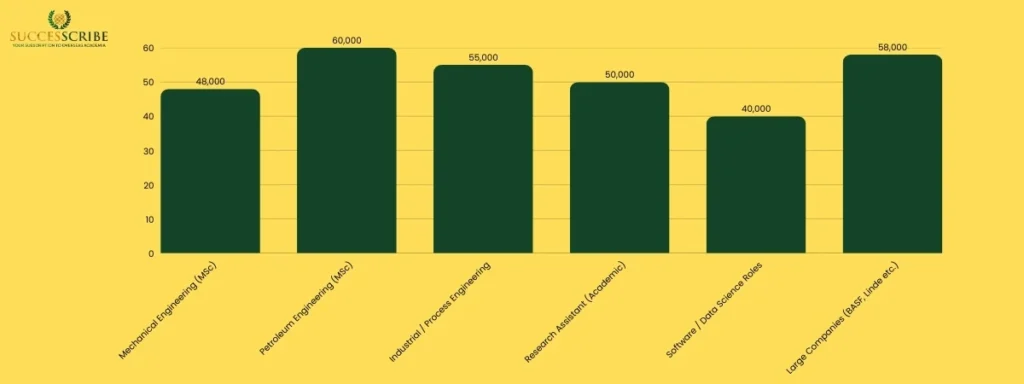
TU Clausthal graduates enjoy a strong reputation and excellent job prospects, thanks to its focused engineering education, deep industry connections, and solid career support services.
| Metric | Insight & Context |
| Alumni Leadership | Among German universities, TU Clausthal ranks 5th for alumni on management boards of major DAX corporations – notable names include RWE, Thyssenkrupp, HeidelbergCement, Aurubis, and Jungheinrich. Given its small size, TU Clausthal leads in alumni representation relative to student numbers. |
| Industry Reputation | FAZ dubbed TU Clausthal “the most renowned university for metallurgy,” underlining its prestige in resource and materials engineering. |
| Strong Demand for Graduates | TU Clausthal states that graduate demand far exceeds supply, especially in sectors like cement, recycling, construction, mechanical engineering, and industrial research. |
Suggested Post: Jobs after masters in Germany
Salaries after Graduation from TU Clausthal
| Program / Career Path | Average Annual Salary (€) | Notes |
| Mechanical Engineering (MSc) | 48,000 | Entry-level positions in manufacturing, automotive & industrial firms |
| Petroleum Engineering (MSc) | 60,000 | High demand in energy & resource sectors |
| Industrial / Process Engineering | 55,000 – 65,000 | Strong demand in chemicals, energy & technology industries |
| Research Assistant (Academic) | 50,000 – 70,000 | Salaries depend on project funding & position level |
| Software / Data Science Roles | 40,000 – 55,000 | Varies by company size & specialization |
| Large Companies (BASF, Linde etc.) | 58,000 – 75,000 | Higher salaries in multinational corporations |
Conclusion
TU Clausthal is a small yet globally oriented technical university, ideal for students interested in engineering, resource management, sustainability, and circular economy. With a vibrant international community (50%), solid industry links, and affordable public education, it delivers strong academic and professional opportunities – especially for those keen on a focused, engaged learning environment.
FAQs
Is TU Clausthal good for international students?
Yes. Around 50% of TU Clausthal’s student body is international, making it one of Germany’s most globally diverse universities. It also offers strong support services, buddy programs, and orientation weeks for newcomers.
Are there English-taught programs at TU Clausthal?
Yes, several Master’s programs (e.g., Mining Engineering, selected Engineering & Digital Technology courses) are taught in English. Most Bachelor’s programs are in German, so language proficiency is required at that level.
Does TU Clausthal charge tuition fees?
No. As a public university, TU Clausthal does not charge tuition fees. Students only pay a semester contribution of about €230.
Is Clausthal-Zellerfeld a safe and student-friendly town?
Yes. With 15,000 residents, it is a safe, close-knit student town surrounded by nature. Everything is within walking distance, making it ideal for focused study and community life.
How good are the career opportunities after graduation?
Excellent. TU Clausthal ranks 5th in Germany for alumni representation on DAX company boards. Graduates are highly sought after in mining, energy, sustainability, and engineering sectors.
Related Post
Total cost of master’s in Germany
IELTS score for German public universities
Sample sop for masters in Germany
Executive MBA without GMAT in Germany

